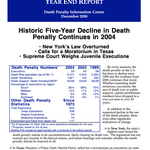The Death Penalty in 2004: Year End Report
Posted on Dec 15, 2004

OVERVIEW Top
By every measure, the death penalty in the U.S. has been in decline since 1999 and the evidence from 2004 continues that trend. Whether examining death sentences, executions, the size of death row or public support, capital punishment numbers have dropped in a way not seen in over 30 years.
In addition to the numerical decline in the use of the death penalty, there were other significant indications of change:
- In New York, the state’s highest court found the death penalty statute to be unconstitutional, likely clearing its death row. The legislature has not enacted any remedy to the flawed statute, and future hearings will consider whether the death penalty should be restored at all.
- In Texas, Houston‘s Police Chief, Harold Hurtt, called for a moratorium on executions on cases from his county, where the police crime lab has been declared unreliable: “I think it would be very prudent for us as a criminal justice system to delay further executions until we have had time to review the evidence.” Judge Tom Price, a 30-year veteran Republican jurist on Texas’s highest criminal court, former FBI Chief William Sessions, and former Texas appellate judge Charles Baird all concurred with Hurtt’s recommendation. The Dallas Morning News, Austin-American Statesman, Houston Chronicle, and San Antonio Express editorialized in favor of such a moratorium.
- The U.S. Congress, after 4 years of debate, passed a modified version of the Innocence Protection Act, and it was signed into law, thereby providing additional protections for the wrongfully convicted and greater resources for those facing the death penalty.
- The U.S. Supreme Court heard arguments in Roper v. Simmons concerning the execution of juvenile offenders. If this practice is found unconstitutional, 72 inmates will be spared execution, and in the future such offenders will receive life sentences instead of death. In a series of cases from Texas, the Court admonished lower courts for failing to afford defendants due process and to follow the Court’s prior rulings. However, many people have already been executed after proceedings the Court would now find unconstitutional.
- In California, the state with the largest death row, the legislature has commissioned a study of the death penalty to uncover risks and flaws in the system.
- In Illinois, the moratorium on executions put in place in 2000 remains in effect.
- In New Jersey, questions about the method of execution have put all cases on hold, and the governor has voiced his support for a moratorium on executions.
PRESS RELEASE Top
Read the press release here.
Tags